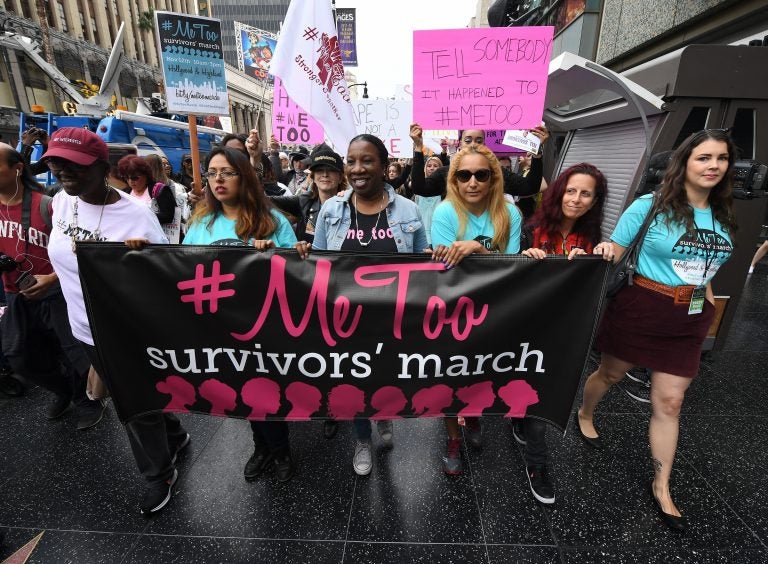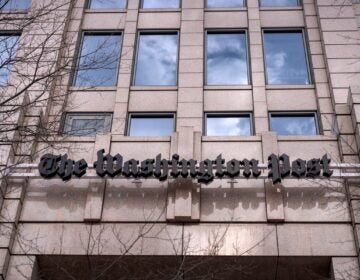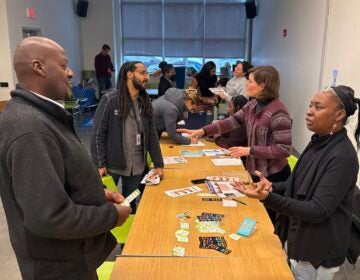Creator of list of ‘media men’ accused of sexual misconduct identifies herself

Women who are survivors of sexual harassment, sexual assault, sexual abuse and their supporters protest during a #MeToo march in Hollywood, Calif., on Nov. 12, 2017. Moira Donegan revealed herself as the creator of an anonymously sourced list of men who work in media accused of sexual misconduct. (Mark Ralston/AFP/Getty Images)
The creator of an anonymously sourced list of men accused of sexual misconduct has chosen to identify herself, as rumors swirled that she would be named in a forthcoming article in Harper’s magazine.
The “S***** Media Men” list first circulated among women working in media in October, shortly after the explosive New York Times story detailing the sexual harassment allegations against Harvey Weinstein.
“I only wanted to create a place for women to share their stories of harassment and assault without being needlessly discredited or judged,” Moira Donegan wrote in an essay published by New York magazine’s The Cut website Wednesday night. “The hope was to create an alternate avenue to report this kind of behavior and warn others without fear of retaliation.”
Donegan is a former editor at the New Republic who also worked at the magazine n+1. She’s written for The New Yorker, the London Review of Books, and Bookforum magazine.
Donegan says she never anticipated the list would go public; she now calls herself naive for believing it could stay private. She also says she didn’t expect that naming a man as a harasser would have consequences for them, describing it as a notion born out of cynicism.
Overall, she says, the fallout from the list was far from what she intended.
“[The list] was intended specifically not to inflict consequences, not to be a weapon — and yet, once it became public, many people immediately saw it as exactly that,” she wrote.
Donegan says the list was intended to help women in a manner similar to a “whisper network,” but in a way that was “accessible to women who didn’t have the professional or social cache required for admittance into whisper networks.”
Within hours, the Google spreadsheet grew to include accusations against more than 70 men, with offenses ranging from “unsolicited drunken messages” to rape.
“The men ranged in age from their 20s to their 60s, and 14 had been highlighted in red to denote more than one accusation of sexual assault or rape,” Donegan writes.
The spreadsheet Donegan created went viral. It also preceded news outlets’ investigations of some of the men whose names were in it.
The list circulated as several media outlets, including NPR, fired or suspended male executives who’ve been accused of harassment.
Donegan says that she took the list offline after 12 hours, but that it continued to circulate in offline versions.
Because the spreadsheet was sourced anonymously, she says she added a disclaimer: “This document is only a collection of misconduct allegations and rumors. Take everything with a grain of salt.” Donegan says women could “judge the quality of that information for themselves and to make their own choices accordingly.”
Donegan says she took the list down after being alerted that BuzzFeed planned to publish an article about it. The list itself was subsequently published on Reddit.
She writes:
“In the weeks after the spreadsheet was exposed, my life changed dramatically. I lost friends: some who thought I had been overzealous, others who thought I had not been zealous enough. I lost my job, too. The fear of being exposed, and of the harassment that will inevitably follow, has dominated my life since. I’ve learned that protecting women is a position that comes with few protections itself.”
NPR has reached out to the New Republic for comment on Donegan’s allegation about losing her job; they have not yet responded. We’ll update this story when we get a response.
Donegan says that she decided to go public after she “learned Katie Roiphe would be publishing my name in a forthcoming piece in Harper’s magazine.”
Rumors about Harper’s revealing the list’s creator began circulating on Twitter this week, prompting a backlash in which other writers pledged to pull their stories from the magazine to pressure it to not publish Donegan’s name.
(Roiphe told The New York Times she didn’t intend to publish Donegan’s name.)
The document got a bigger reaction than she anticipated, Donegan writes: Instead of collecting “unspoken knowledge” shared among “the women in my circles,” she says, she found a “broader reckoning with abuses of power that spanned an industry.”
Donegan says that the “experience of making the spreadsheet has shown me that it is still explosive, radical, and productively dangerous for women to say what we mean.”
She ends her piece in The Cut by calling for women to “examine the ways we might wield the power we already have. Among the most potent of these powers is the knowledge of our own experiences.”
Donegan wrote, “The women who used the spreadsheet, and who spread it to others, used this power in a special way, and I’m thankful to all of them.”
9(MDAzMzI1ODY3MDEyMzkzOTE3NjIxNDg3MQ001))




